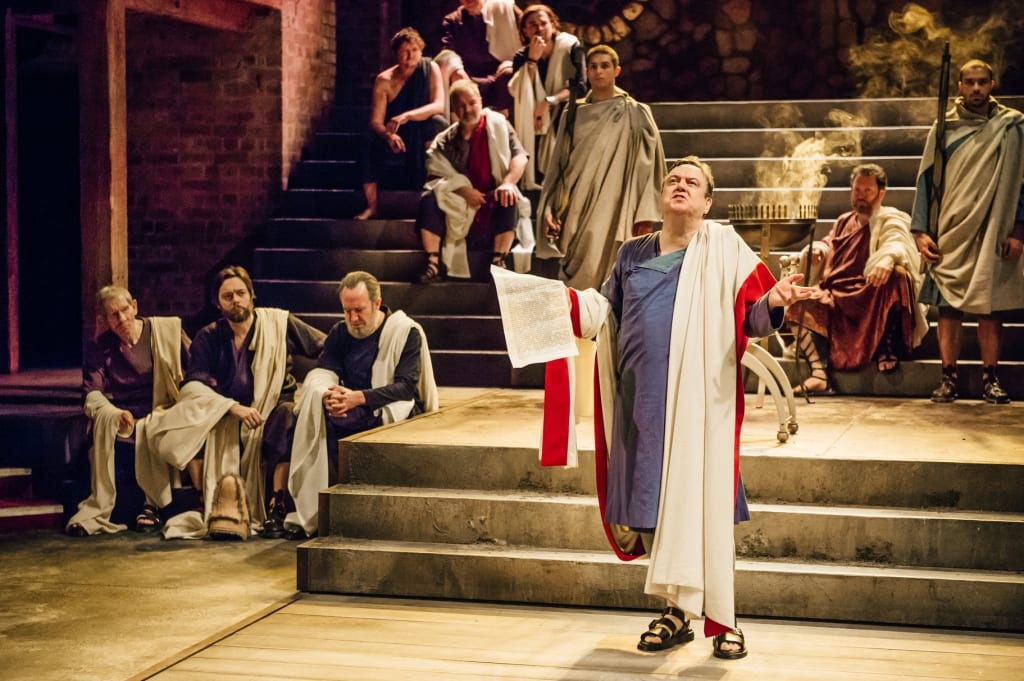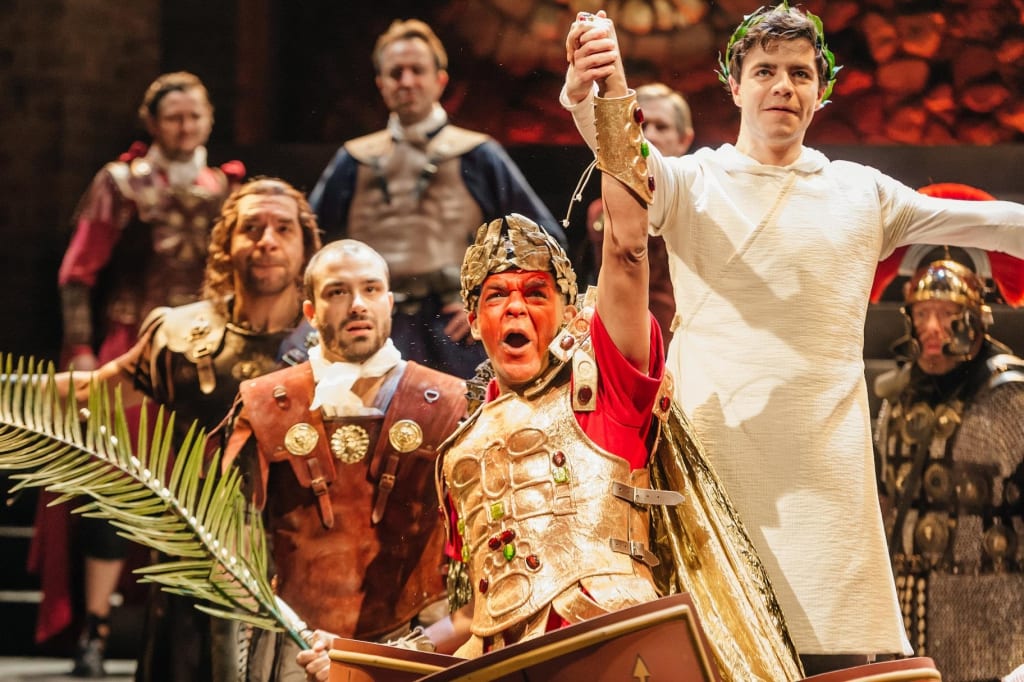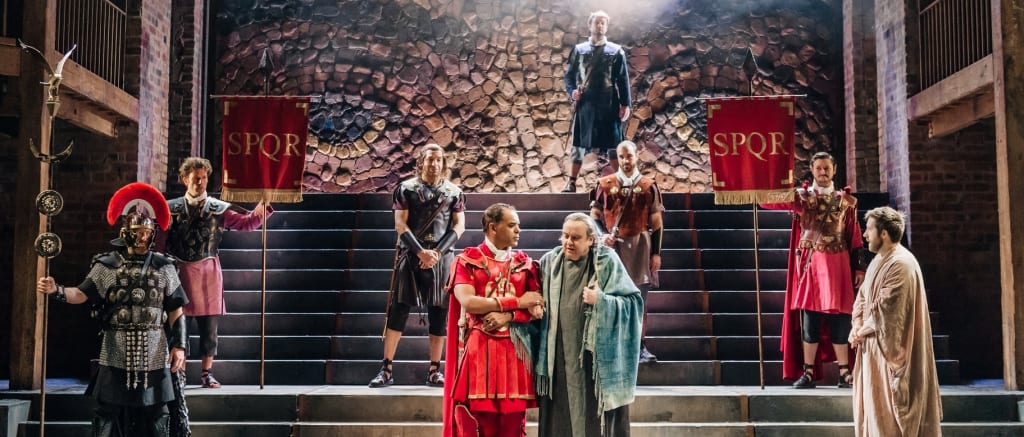The RSC has done a remarkable job of turning Robert Harris’s Cicero Trilogy into a stage work. By summarizing the action of Volume I, which deals with the trial of Gaius Verres that catapulted Cicero to fame, the plays can effectively begin with the drama of the Catiline Conspiracy and move forward to the assassination of Julius Caesar and its consequences, constantly bringing into focus the important roles that Cicero played in these historic events. The characterisations of all the actors in these happenings are compelling, clearly presented and believable; the story telling is clear; and the parallels to modern politics speak for themselves simply because the venality and mendacity of present day self-absorbed and ambitious people have not changed all that much in two thousand years.

Imperium is set in the period when Rome’s five hundred year old Republic finally fell apart and was replaced ultimately by the effectively totalitarian dictatorship of the Caesars. All the historic characters are portrayed much as developed by Robert Harris in his novels and Mike Poulton has achieved an intelligent, exciting and utterly gripping adaptation. As always with productions directed by Gregory Doran, the acting is very fine and full of telling, vivid details. Each actor stands out in his or her special moments; and yet works comfortably as a contributing member within a strong ensemble. Imperium works on many levels – as a history lesson; as a provocation to think about politics and politicians; as a gloss on the conundrum facing politicians in every society between service to the community and the vanity of personal ambitions; and as a completely gripping piece of theatre. Peter de Jersey is a completely believable, sneaky yet heroic Julius Caesar; Christopher Saul is a terrific Pompey, especially with his Donald Trump quiff; Siobhan Redmond is a memorable and touching Terentia whose frustration with and love for her husband, Cicero, are both completely convincing. I was also particularly impressed by the terrible sister-brother act of Pierro Niel-Mee as Clodius and Eloise Secker as Clodia, by Niel-Mee again as Agrippa; and by Patrick Knowles as the ambiguous, unfathomable, precocious Octavius.
Above all the evening belongs to the team of Joseph Kloska as Tiro, an appealing and sympathetic historic character who was indeed the amanuensis slave of Cicero and whose historically real but lost biography of his master we are supposedly following; and the always surprising, exciting and utterly compelling Richard McCabe as Cicero. McCabe’s is a brilliant, nuanced portrayal. Apart from anything else, he and Joseph Koska deserve an award for sheer stamina, being onstage most of the time in a play that takes seven hours to perform. McCabe and Kloska also perform with brilliant comic timing when required, like the best comic duos playing off each other. McCabe succeeds engagingly at the task this huge role demands of him to bring alive every showy rhetorical highlight of the public life of Cicero. He convincingly portrays Cicero’s historic theatrical splendour and charisma, his wit and intelligence, as he opposes Catiline in the Senate and rouses people against him, as he attacks Mark Anthony in the Philippics, as he contemplates his fate privately in monologues or talking to Tiro, as he ponders what he must do as the various crises of that period unfold – flee to Athens and concentrate on studying and writing philosophy; or stay and try to save the Republic that he loves. Also the relationship between Cicero and Tiro is the pivot of the entire play: warm, supportive.

The set and costume design by Anthony Ward is superbly evocative of the world of ancient Rome; the auditorium is transformed into a pseudo-Senate and we find ourselves among the Roman citizens being addressed, harangued, cajoled and, at times, taught. Contemporary jokes and anachronisms are permitted and all manner of theatrical games and tricks with the audience are played. We are brought into the action at times; and sharply distanced from it at others. The shocks and surprises abound. The characters evoke sympathy or appalled disbelief as required. The entire production team has done a superlative job and needs to be praised, including composer Paul Englishby, fight director Terry King, lighting designer Mark Henderson and sound designer Claire Windsor. Full praise also must go to Gareth Ellis and his musicians who create a strong sound world for this production.
Everyone in this production of Imperium: the Cicero Plays is involved in a tour de force of acting, characterization and startling yet apt theatrical energy. The plays are informative, moving and utterly entertaining. This is a triumph of the RSC right up there with their adaptation of the Hilary Mantel novels about Thomas Cromwell, Wolf Hall and Bring Up the Bodies. I hope it transfers to the West End, tours the world and is broadcast into cinemas internationally. It deserves as wide an audience possible. And I also hopes it provokes its audiences to seek out and read the trilogy of books about Cicero by Robert Harris: Imperium, Lustrum and Dictator. If you want to read more on the actual history, there is also a fine trilogy of history books by Adrian Goldsworthy telling the life stories of Julius Caesar, Antony and Cleopatra and Augustus, the emperor that Octavian became.

